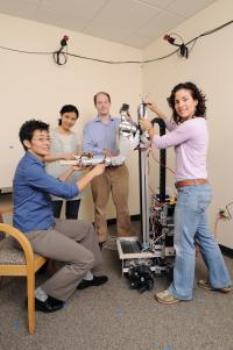Three projects conducted by researchers at the Georgia Institute of Technology have received funding from the National Science Foundation’s Division of Emerging Frontiers in Research and Innovation (EFRI).
 Terapeutic robots
Terapeutic robots
The EFRI team will be exploring the biology and engineering aspects in greater detail, which may lead to future technological inventions. The projects that the Georgian team is working on are the development of a therapeutic robot, developing wearable sensors and building and testing of quantitative models that mimic motor and rehabilitative skills of cell differentiation of tissues.
The therapeutic robot has been designed to help people who have deficiencies in motor skills by aiding their motor skills. The researchers are working on developing a humanoid robot for rehabilitation, which is programmed to perform a partnered box step for shifting the body weight and direction of motion depending upon the person. In order to perfect the robot’s motion the researchers will first need to study the movement of humans by observing their muscles and balancing motion while moving along with another person. Another concept that the team will be studying is the rehabilitative partnered dance, which will help in programming the robot for helping people with motor impairments. The second project involves working with wearable sensors that work on human-machine interaction. These sensors are based on alternative perception, which is a combination of electronics and other vision sensing techniques to help the visually impaired people. These sensors are designed to recreate the co-ordination between human senses such as vision, touch etc. The researchers have already developed a model of an array of multifunctional sensors, which will be of great help to a visually impaired person by making him aware of his surroundings.
All the research work will be a co-ordination between the teams from the various departments of the City College. The final project will find out the controlling factors of the spatial and temporal patterns of cell differentiation. By deciphering the control mechanisms, the researchers will be able to arrive at a better understanding of the concepts of embryogenesis, cause of developmental disorders and regenerative medicine. It has already been established that the first of the developments that happen in the embryo’s development is the dorsoventral axis. Researchers will now look into how this axis unfolds giving particular importance to the location of proteins that form into muscle, skin tissues and nerves. The team will utilise a microfluidic device that is capable of orienting hundred embryos in a few minutes.